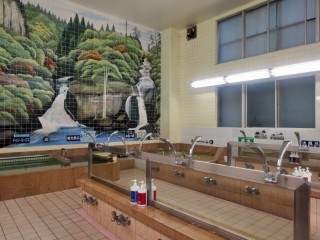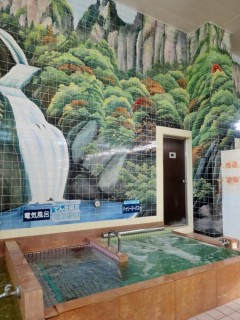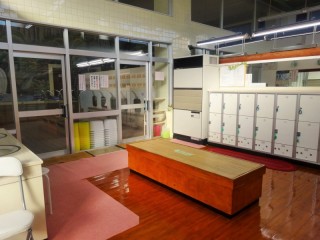Loading
Search
▼ Hasunuma Onsen
- Category:Hot spring
Despite reports to the contrary, Japan’s bathhouse culture is alive and thriving. Ota Ward, the largest of Tokyo’s 23 wards, counts 45 bathhouses scattered amongst in various neighborhoods, many of which draw their water from a natural hot spring source at the bottom of nearby Tokyo Bay.
Hasunuma Onsen is one of the district’s many accessible sento (traditional bathhouse), located just a few minutes’ walk from Hasunuma station on the Tokyu Ikegami Line. The building is easily identified by the symbol “ゆ” hanging over the door, a universal indication in Japan for bathing facilities. While the outside of the building may not inspire visitors, the interior of the bathing areas themselves are adorned with stunning tile murals. Large-scale artworks featuring forests and waterfalls loom large on the rear wall, while distant mountain views running along a border near the ceiling are designed to give bathers the impression of soaking in an outdoor tub in the countryside. The baths themselves are immaculately kept. Several of the tubs include swirling jets while a cold plunge tub sits to the side. Ota Ward is famous for its kuroyu, “black hot spring water” that has been piped in from deep underground and that often contains miniscule particles of fossilized plants. Rather than being seen as filth, these particles are believed to give the water its skin-beautifying properties.
English speakers need not be shy at Hasunuma. The managers warmly welcome travelers and residents alike and have prepared English translations of all necessary information for foreign visitors. They boast a sizable stock of bath supplies, ranging from soaps to combs to shaving paraphernalia, and also rent both large and small towels. The only caveat to the onsen experience at Hasunuma is that bathers with tattoos are not permitted. Hasunuma Onsen opens every day, except Tuesday, from 15:00 to 25:00. Entrance for adults costs ¥460. Children are more than welcome to bathe here as well, with entrances fees lowered accordingly.
A 2-minute walk from Hasunuma Station on the Ikegami Line.
Hasunuma Onsen is one of the district’s many accessible sento (traditional bathhouse), located just a few minutes’ walk from Hasunuma station on the Tokyu Ikegami Line. The building is easily identified by the symbol “ゆ” hanging over the door, a universal indication in Japan for bathing facilities. While the outside of the building may not inspire visitors, the interior of the bathing areas themselves are adorned with stunning tile murals. Large-scale artworks featuring forests and waterfalls loom large on the rear wall, while distant mountain views running along a border near the ceiling are designed to give bathers the impression of soaking in an outdoor tub in the countryside. The baths themselves are immaculately kept. Several of the tubs include swirling jets while a cold plunge tub sits to the side. Ota Ward is famous for its kuroyu, “black hot spring water” that has been piped in from deep underground and that often contains miniscule particles of fossilized plants. Rather than being seen as filth, these particles are believed to give the water its skin-beautifying properties.
English speakers need not be shy at Hasunuma. The managers warmly welcome travelers and residents alike and have prepared English translations of all necessary information for foreign visitors. They boast a sizable stock of bath supplies, ranging from soaps to combs to shaving paraphernalia, and also rent both large and small towels. The only caveat to the onsen experience at Hasunuma is that bathers with tattoos are not permitted. Hasunuma Onsen opens every day, except Tuesday, from 15:00 to 25:00. Entrance for adults costs ¥460. Children are more than welcome to bathe here as well, with entrances fees lowered accordingly.
Getting there
A 2-minute walk from Hasunuma Station on the Ikegami Line.- January 2, 2018
- Comment (0)
- Trackback(0)





